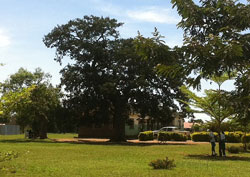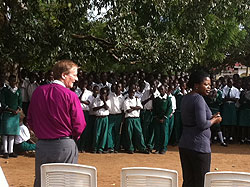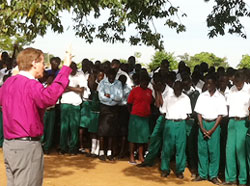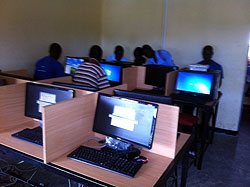 The children at Beacon of Hope gather for their assemblies and worship under the shade of a huge tree, related to the fig tree, that has become holy ground to us all. If you drive up after they have begun their worship, you can hear them singing from several hundred feet away. These kids are so full of joy and so grateful to be here, I can never think of them without feeling joyful and grateful myself.
The children at Beacon of Hope gather for their assemblies and worship under the shade of a huge tree, related to the fig tree, that has become holy ground to us all. If you drive up after they have begun their worship, you can hear them singing from several hundred feet away. These kids are so full of joy and so grateful to be here, I can never think of them without feeling joyful and grateful myself.

When I arrive this morning they are all standing around in a neat semi-circle. I greet old friends in the administration and faculty as chairs are set out for the “distinguished visitors” and a typically ceremonious program of introduction follows, with an opening prayer from a student, very brief remarks from several of the team, until I am asked to preach.
I walk around in front of them and just talk to them without notes. This is exam week, and I can see the anxiety on some of their faces. I tell them first how glad I am to be with them. I ask them did they sleep well, a common good-morning question in Uganda, and they all answer “Yes, sir.” “Very good,” I reply. “I did not sleep well. I was kept awake by the frogs.” This was absolutely true: there had been a chorus of frogs under my window which lasted for several hours. I then gave a blow by blow account of the Night of the Frogs, complete with appropriate frog noises, and concluded that the whole night had been a tragedy: I had been unable to share the frogs’ joy, and they had been unable to sympathize with my suffering.

I then went to 1 Corinthians 12, and noted what Paul says about the Body of Christ: “When one member suffers, all suffer together; when one member is honored all rejoice together.” I told them I thought this was very important, especially during exams, when we should not be the way the frogs and I were toward each other. Sometimes the stress of an exam can make us think only of ourselves, or be jealous of our classmates. But if I can only remember three things, perhaps I can find a way out of my anxiety: First, that I alone am responsible for the things I do or do not do, that cause trouble in my life. Second, that God has forgiven me those things through the Cross of His Son Jesus, so that I can now live in freedom, peace and joy. Third, knowing this means that I can look more easily, not to my own needs, but to the needs of my friends, and my classmates, to help those who are struggling or anxious, and to ask for help from others for myself. I suggested that if we could all pray for the grace to relax a bit and take care of one another in this way, everybody will do better on their exams than they would otherwise. There were lots of smiles, so I think perhaps they were a little encouraged. And lots of squeals and applause when I told them I had brought them 500 pencils and 500 pens, enough for everybody!
 Afterwards, I made the rounds of the school, saw the great new computer and chemistry labs that had been funded by my former parish, Church of the Redeemer in Chestnut Hill Massachusetts, and talked with several of the faculty and administration about the future direction of the school. We face huge challenges in finances and are cramped in our existing facilities. We need additional dormitory space, an assembly hall, and a real library, and know in order to get these we will eventually have to move to the future site of Teso University which we are planning to build about an hour away in Bogonda. The return of a secure peace to the region means that we will have fewer and fewer war-affected children. But we will always have the poor, the orphaned, and kids affected by AIDS. And we will be offering our three specialties: excellent math and science programs in a curriculum also rich in the humanities; a real gift for turning under-performing students into confident and sometimes superb scholars; and a transformational environment for Christian formation, through which we help kids build strong faith and strong characters through the nurture of their souls.
Afterwards, I made the rounds of the school, saw the great new computer and chemistry labs that had been funded by my former parish, Church of the Redeemer in Chestnut Hill Massachusetts, and talked with several of the faculty and administration about the future direction of the school. We face huge challenges in finances and are cramped in our existing facilities. We need additional dormitory space, an assembly hall, and a real library, and know in order to get these we will eventually have to move to the future site of Teso University which we are planning to build about an hour away in Bogonda. The return of a secure peace to the region means that we will have fewer and fewer war-affected children. But we will always have the poor, the orphaned, and kids affected by AIDS. And we will be offering our three specialties: excellent math and science programs in a curriculum also rich in the humanities; a real gift for turning under-performing students into confident and sometimes superb scholars; and a transformational environment for Christian formation, through which we help kids build strong faith and strong characters through the nurture of their souls.
When Beacon of Hope was started in 2006, we took 400 of the most damaged young people who had survived the Kony wars. We told the city fathers of Soroti that we were going to offer these desperate and often violent children a first rate education, trauma counseling and healing, in the embrace of a Christian family, all for free, because we thought God wanted them to be the future leaders of Uganda. Many people openly laughed at us. Now they want to send their own children to our school. We have an incredible amount of work to do, just to keep the place going, and more to help it become everything it could be. But when I think of what’s happened in seven years, I think anything is possible with God. And I wonder how Pittsburgh and our diocese, with our rich resources and experience in education, may in the coming years become part of this story.
